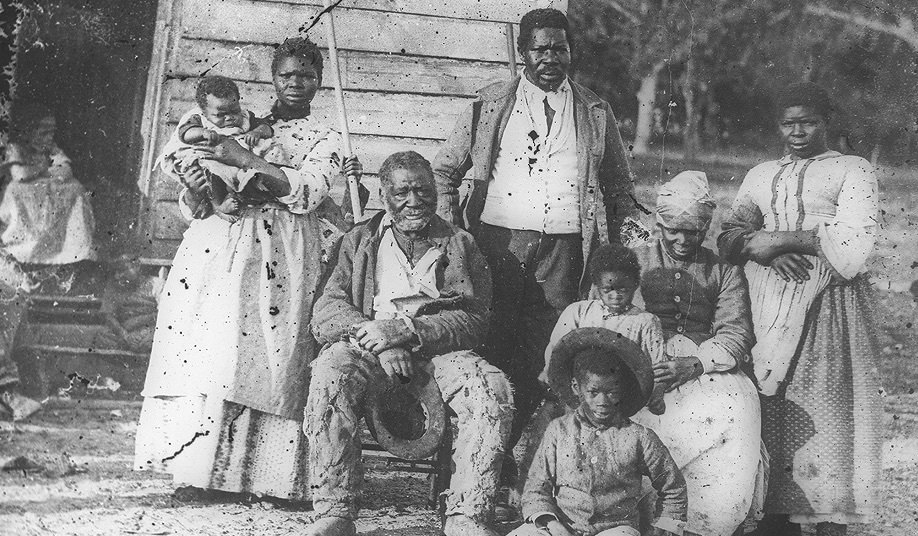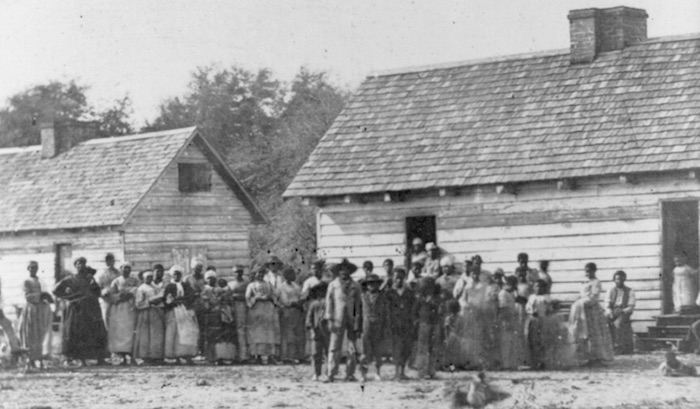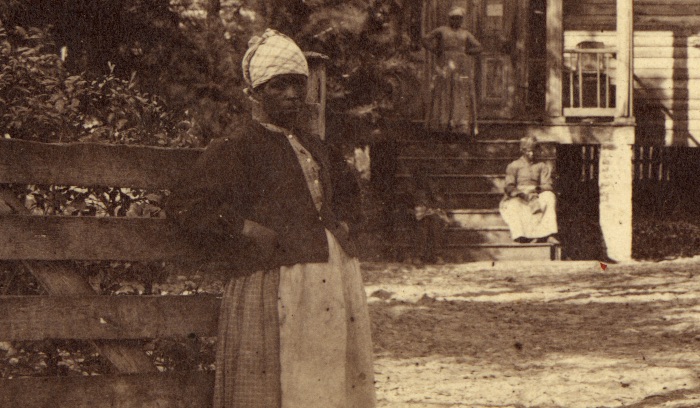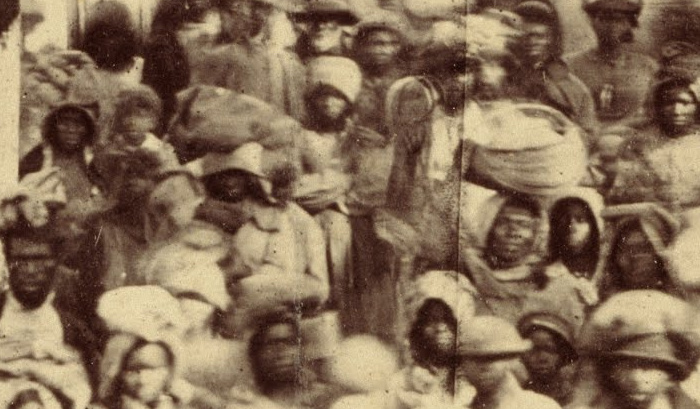Slavery is common to a lot of RPGs, especially fantasy ones. From drow slavers to mul slave-gladiators, there’s a real chance your PCs might meet, be, or become slaves. How do you make that feel real? We’re all familiar with the forced labor, the whippings, the families torn apart. Americans learn about it in school, and it becomes rote knowledge – no longer emotionally compelling. We need other aspects of slavery to make enslaved NPCs come alive for us at the table.
During the Great Depression, the U.S. government’s Works Progress Administration (WPA) paid unemployed writers and researchers to visit former slaves and collect their stories. It had been 70 years since the government abolished slavery. Folks who remembered being enslaved were old and dying. The WPA’s Slave Narrative Collection preserved their stories for posterity. Hearing ex-slaves talk about their experiences humanizes slavery in a really striking way. It’s a gold mine of NPCs, adventure hooks, and little details that makes the experiences of the enslaved come alive at your table. The details are particular to American agricultural slavery, but are easy to apply in any setting.

Small plot hooks
Josephine Smith (age 94) recounted seeing a mother who had been sold away from her three-weeks-old baby, and was being marched as part of a chained line of 30 slaves from Louisburg, North Carolina to New Orleans. It was a blazing August afternoon, and the woman walked until she fainted. While waiting for her to recover, the rest of the line (or ‘coffle’) rested beneath an oak tree and the speculators who owned the slaves ate lunch. Their chained property went hungry. The mother begged passers-by for a drink of water. When the line started moving again, the woman collapsed and died. If the PCs encounter this coffle, do they give the woman water? If they have magic or technology that can save her life, do they use it? Is death better than being enslaved, and is it the party’s place to decide that for someone else?
Ann Parker (age 103) spoke of gatherings where enslaved folks from nearby plantations came together in secret to talk and sing and dance. She once attended a gathering in a barn that was discovered by the pattyrollers – white patrollers who enforced the subservience of the enslaved. Folks scattered, but the pattyrollers managed to grab some, and those men and women were whipped. PCs might help enslaved folks sneak into the barn, keep watch, or distract the pattyrollers so the enslaved can flee when discovered.
Elias Thomas (age 84) talked about two escapees from the nearby Crump plantation. The men fled to escape a whipping and hid in the woods. A third enslaved man bumped into the runaways at night and told them there were bears in the woods. The two escapees were so scared, they returned and took their whippings. There are a lot of missing pieces to this story. Thomas implies there weren’t bears in the woods, so why did the third man lie? Was he sent by old man Crump to retrieve the runaways? If not, did Crump know the third man was out and about after dark? Did the third man know where to find the runaways, or did they run into each other by chance? At your table, if your PCs overhear the conversation between the three enslaved men, they may want to get to the bottom of these questions before deciding whom to help and in what way.
Ria Sorrell (age 97) described a cruel game her ‘missus’ would play on her. She’d hide her baby’s cap, then tell Ria to find it. If Ria couldn’t, the missus would whip her. If you want to make your players deeply uncomfortable, have an NPC involve the PCs in this game. They’re guests at someone’s house because they need something from them. Then the host hands her baby’s cap to one of the PCs and asks them to hide it somewhere clever. That done, she calls in an enslaved man and begins the game. How do the PCs react when spoiling the ‘fun’ might upset someone they need?
Parker Pool (age 91) described how enslaved men would sneak away from their plantations to court enslaved women kept on neighboring farms. These men had to evade the pattyrollers to see their girlfriends. If the lovers married in the eyes of God and custom, the husband might ask his master for a pass to see his wife every Saturday night. There was no legal recognition of the marriage. PCs might help a man sneak to a neighboring plantation to see his wife or convince the man’s owner to give him a pass. The wife’s owner probably doesn’t need convincing. Her children will be (free) new property for him. But the husband’s master has no such incentive.

Living details
Hannah Crasson (age 84) said her master gave his enslaved farmers garden patches so they could raise their own food. But since they had to work all day in the master’s fields, the farmers had to work their own patches at night. PCs out after dark may see slaves, exhausted after a full day in the fields, weeding their small gardens by moonlight.
Mattie Curtis (age 98) described being completely naked until the age of fourteen, including for her first period.
Bob Jones (age 86) worked in his master’s house rather than in the fields. He and the other house slaves had a special fear of the master’s wife. Even when she wasn’t whipping them, she “fussed so bad that she mighty nigh ran us all crazy”. The only way to escape her wrath was to avoid her, and the six house slaves competed to see who could stay out of her sight the longest. Your PCs might stumble on the house slaves hiding out of sight while the lady of the house searches for someone to berate or to beat.
Parker Pool (age 91) described supplementing his family’s diet by catching opossums and raccoons. Presumably he did this with snares and with his bare hands, since slaves were forbidden access to firearms. This restriction kept Parker from hunting higher-status game like deer. To adapt this detail to your setting, you can have the PCs see an enslaved child creeping up on and grabbing a ‘trash’ animal like a giant insect or worm.
W. L. Bost (age 87) talked about the religion of the enslaved. Many were made to attend services at their master’s church, but others were forbidden to congregate, even for worship. Bost would sneak into the woods behind the barn for Christian prayer meetings. The parishioners usually didn’t have Bibles, since it was forbidden for a slave to learn to read. That said, Bost knew one enslaved child who had learned to read and taught the Bible to his fellows. PCs could stumble on a secret prayer meeting or meet an NPC based on this child!

NPCs
Ann Parker (age 103) said that her mother, Junny, was a queen and a witch before she was kidnapped in Africa and transported to America. It’s hard to know exactly what Ann means by this. She was describing her mother in a way the interviewer would understand, and Junny probably described her position differently to Ann than she would have to someone born in her homeland. Regardless, Ann recounts that when there were no whites around, the other slaves would bow down and obey her mother. A few days before General Lee’s surrender, aged Junny foresaw their freedom in her coffee grounds and the family fled the plantation. At your table, a sorcerous former royal like Junny could be a great NPC.
Mattie Curtis (age 98) described a slave owner named Moses Mordicia: “He was mean too. He’d get drunk and whip [slaves] all day, off and on. He’d keep them tied down that long too, sometimes from sunrise ’til dark.” Drunk, abusive Moses Mordicia makes an amazing (and monstrous) NPC. If your PCs pass by his farm twice in one day, they might see the same woman tied down both times – but with more welts and cuts in the evening than in the morning. Compassionate PCs might try to buy that woman off your Moses Mordicia-based NPC. Clever PCs might even take advantage of Moses’ alcoholism and pay him in booze instead of cash. With cash, he could buy someone else to replace the woman the PCs free. With booze, all he can do is drink it. (Though while drunk, he’ll probably be a lot worse on his remaining slaves, so keep that in mind.)

Playing with slavery on hard mode
This last bit is tricky to pull off, and should only be attempted after some vignettes or interactions with enslaved NPCs make clear that slavery in your setting is a Bad Thing. Enslaved people, being people, had a great diversity of experiences and opinions. Some freedmen would later look back fondly on slavery. Any number of explanations can be found: nostalgia for their youth, being interviewed during the Hard Times of the Great Depression, telling the (mostly white) WPA interviewers what they wanted to hear, or having exceptional masters. Nonetheless, if you can portray these positive opinions as being the idiosyncratic opinions of an individual, not the group, it can go a long way to making the enslaved NPCs in your campaign feel more distinct – and therefore more human.
Quoting Simuel Riddick (age 95): “I haven’t anything to say against slavery. My old folks put my clothes on me when I was a boy. They gave me shoes and stockings and put them on me when I was a little boy. I loved them and I can’t go against them in anything. There were things I did not like about slavery on some plantations, whipping and selling parents and children from each other, but I haven’t much to say. I was treated good.”
Presenting an idiosyncratic, individualized positive view of slavery is definitely Playing On Hard Mode, so think carefully before you attempt it.






